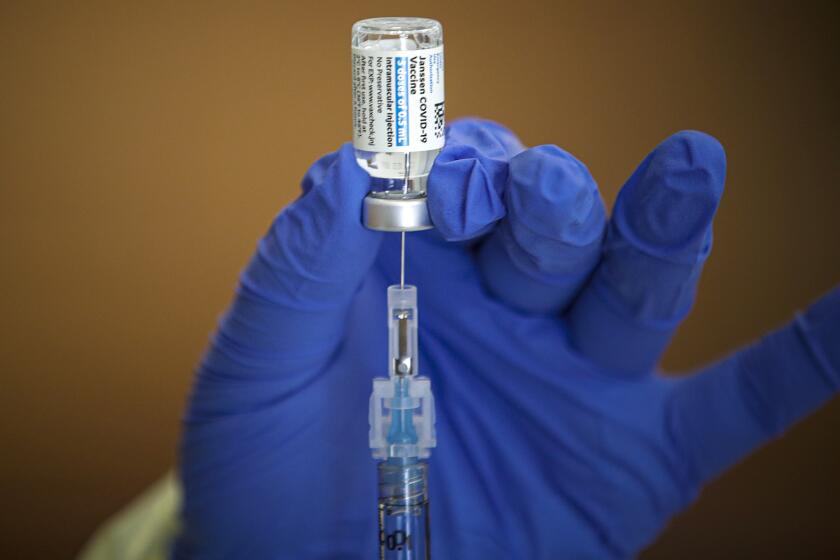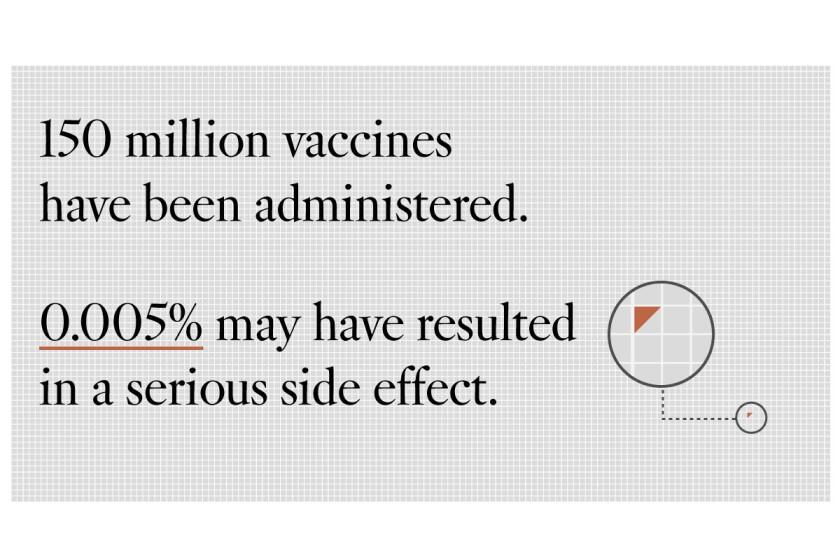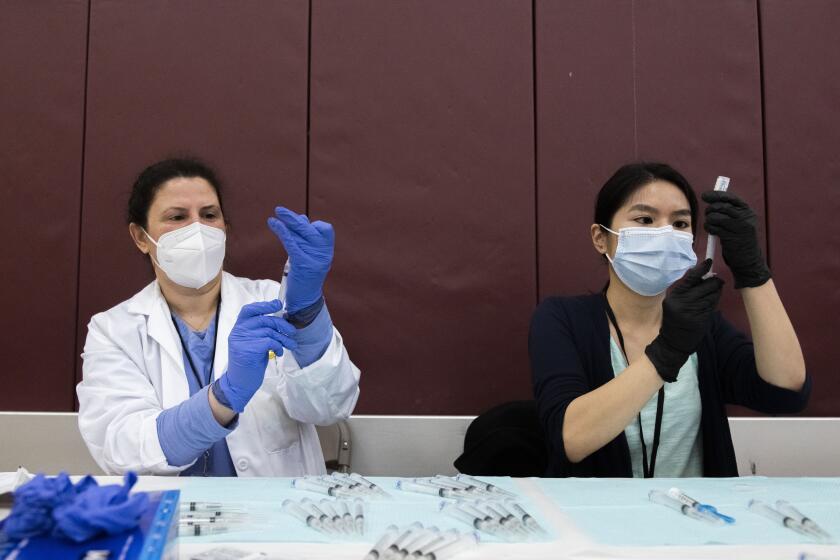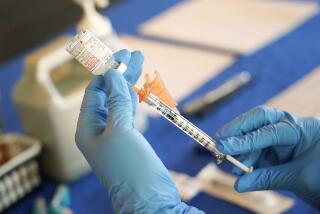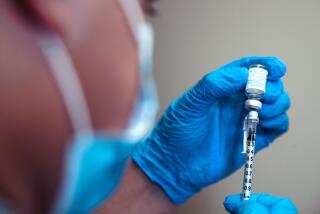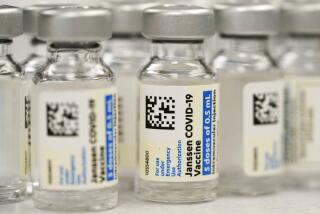Feeling anxious because you got the Johnson & Johnson vaccine? Here’s what to do
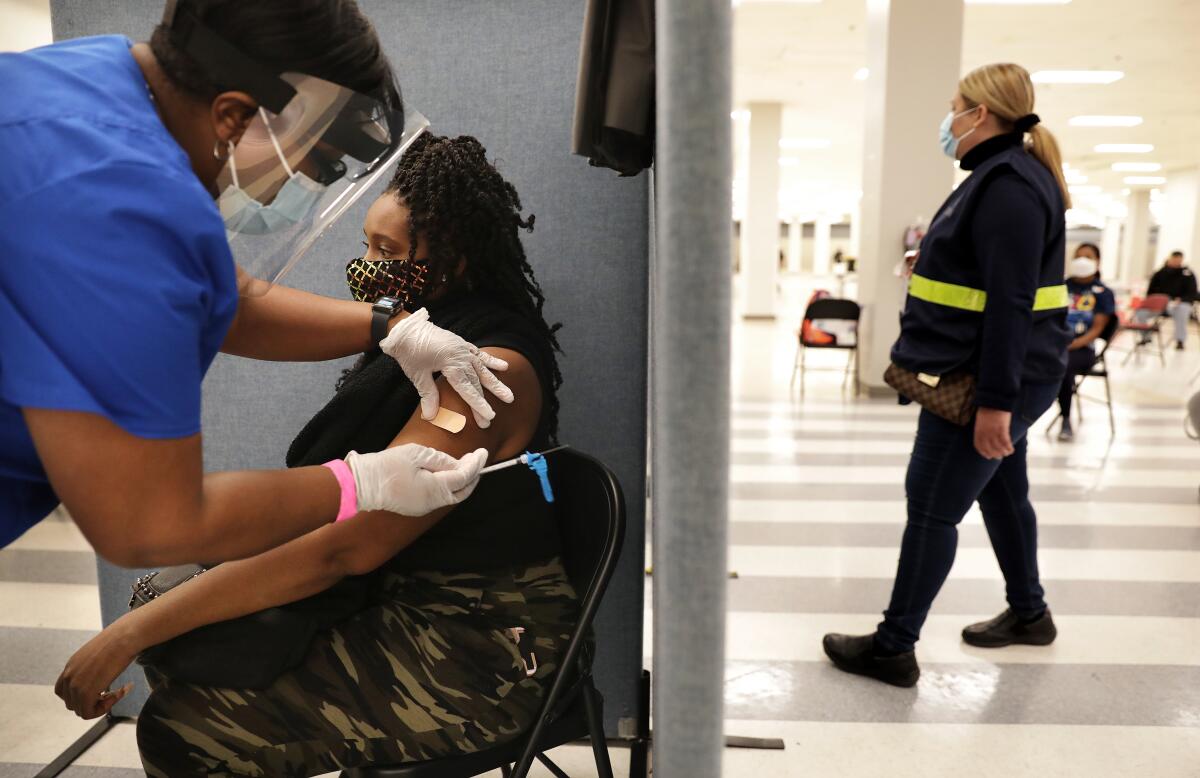
- Share via
James Taber first heard of the federal government’s recommendation that states pause the use of Johnson & Johnson’s COVID-19 vaccine on Twitter.
The hiatus was necessary to give scientists a chance to investigate reports of six women who developed a rare type of blood clot after getting the vaccine, according to officials at the Food and Drug Administration and the Centers for Disease Control and Prevention.
One of Taber’s favorite authors, Chuck Wendig, was incredulous. He composed a tweet to share his reaction.
“They’re pausing the J&J? For six cases out of seven million shots?” Wendig wrote. “I guess I appreciate any due diligence and caution but that seems... an overreaction?”
Taber, a middle school librarian, had received the Johnson & Johnson shot about a month ago. For a moment, he admitted, he felt worried.
“I know that blood clots can be a real issue,” he said. “I think of getting an embolism or an aneurysm.”
But then he did a little research and confirmed that just six of these clots had been reported out of the roughly 7 million Johnson & Johnson shots that had been administered in the United States so far.
The disparity between those numbers immediately put his mind at ease.
He also took comfort in another tweet from writer Adam Christopher.
“You are THOUSANDS of times more likely to have a car accident on the way to your vaccination centre,” Christopher wrote.
That helped too.
“Now it doesn’t bother me,” he said. “Maybe if I start feeling short of breath and having pains in my legs or something I’ll start worrying, but to be honest, I haven’t been thinking about it.”
U.S. officials called for a pause in the use of Johnson & Johnson’s COVID-19 vaccine after serious blood clots were reported in six recipients.
Not everyone is as sanguine as Taber, however.
So the L.A. Times reached out to experts for guidance. They helped us think through the risk posed by the Johnson & Johnson vaccine. They also offered advice on how to calm your nerves if you are feeling anxious about your shot, how to tell if you develop a worrisome symptom, and what to do if that happens.
Should someone who got the Johnson & Johnson shot be nervous?
No.
The important thing to keep in mind is that these blood clot cases are extremely rare, said Dr. Edward Jones-Lopez, an infectious disease specialist at Keck Hospital of USC. More than 6.8 million people in the U.S. had received the Johnson & Johnson vaccine as of April 12, and just six of them developed the condition known as cerebral venous sinus thrombosis, or CVST.
It’s not clear at this point what role — if any — the vaccine played in the development of the blood clots, and it may turn out that other risk factors were responsible, Jones-Lopez said.
The CDC’s Advisory Committee on Immunization Practices will meet Wednesday to review the cases and investigate the link between the vaccine and the clots.
What are the odds of a problem if you did get the shot?
“It’s less than one in a million,” said Dr. Anthony Fauci, the top U.S. infectious disease specialist.
And for some people, it’s even less. All of the blood clots occurred in women ages 18 to 48, so if you fall outside of these parameters, you have even less reason to worry, Jones-Lopez said.
For now, the benefits of receiving a COVID-19 vaccine far outweigh the risks.
“This pause is to review and refine the risks of this vaccine in specific populations, but given the prevalence and dangers of COVID-19, vaccination is still very much recommended,” he said.
What symptoms should I look for to know if I have a problem?
Abdominal pain, leg pain, severe headache or shortness of breath within three weeks of getting the vaccine could be a symptom of CSVT, the FDA and CDC said. If any of these occur, contact your healthcare provider.
The typical arm soreness and flu-like symptoms that occur in the first few days after getting the vaccine are nothing to worry about.
How do I stay sane during that three-week waiting period?
Try to be patient and know that the odds are on your side, Jones-Lopez said.
“I personally enjoy meditation and exercise, but use your typical healthy coping mechanisms,” he said.
Two COVID-19 vaccines have now been linked to a risk of developing blood clots. Scientists don’t know whether the vaccines are to blame.
How can I trust that COVID-19 vaccines are safe?
Regulators continue to monitor the safety of the vaccines even after they are authorized and made available to the general public. The fact that the safety system was able to catch this small number of blood clot cases should be reassuring, said Dr. Walt Orenstein, associate director of Emory Vaccine Center and professor of infectious diseases at Emory University School of Medicine.
“From a patient perspective, it’s important to note that the monitoring system has been good enough to pick up this very rare event,” he said. “And now if anyone should develop this, we know not to treat it as a normal clot, which should be helpful to people.”
The Associated Press contributed to this report.
